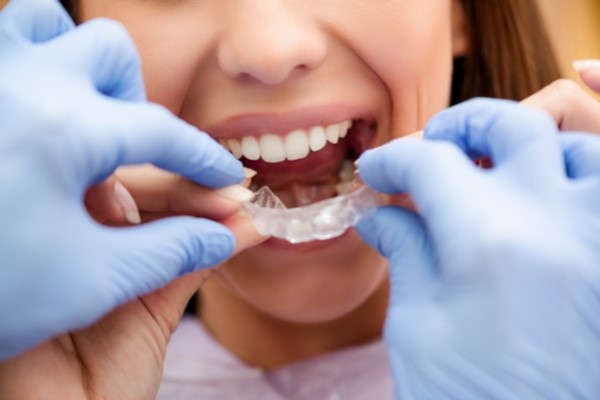How Long Will All-On-4® Implant-Supported Dentures Last?

All-on-4® are quickly becoming popular as a dental restoration that incorporates the benefits of traditional dentures and innovative dental implants. Many patients who are interested in the procedure are also reasonably concerned about the lifespan of the restoration. Since the treatment is still relatively new, there is limited data on how fast the All-on-4® restoration deteriorates. However, considering that dental implants have a success and survival rate of 95%, it is safe to say the prospects are promising.
All-on-4® overview
Before reviewing the life expectancy of this unique dental restoration, one must consider what makes up the All-on-4® system. Four titanium dental implants act as the anchor and have been discovered to last a lifetime in patients, if properly installed. However, the dentures that connect to the implant to form the teeth replacement have a limited lifespan.
Dental professionals advise patients to replace single implant crowns every 10 to 15 years, and dentures tend to last that long as well. It is hard to say if connecting the dentures to the implants will extend the lifespan of either component. Only studies that consider real-life use of the All-on-4® system can accurately determine the lifespan of the dental restoration.
Reviewing available data
The most comprehensive study of how long the All-on-4® system lasts happened back in 2011. The study involved 245 patients who got the All-on-4® implants for 10 years. After five years, 98% of the implants were still in place and functioning properly. Ninety-five percent of them had no case of implant failure. By the end of the 10-year duration, 95% of the implants were still in place. Since every dental implant restoration has a low rate of failure or rejection, patients can expect their dental restoration to last a long time. After 10 years, the dentures fitted to the implants were still in good condition.
Tips to extend their lifespan
If the dentures get damaged, replacing or repairing the prosthesis is relatively easy. However, dental implant failure tends to be more complicated. The following tips can help prolong the lifespan of the All-on-4® system:
- Practice good oral care: Taking good care of oral health and dentures will reduce the risk of damage. Having dentures does not remove the need for brushing. Maintain good oral health increases the chances of successful implant surgery. Patients need to visit their dentist regularly as well to keep the restoration in good shape.
- Select a good dentist: A dentist with experience in dental implants can help prevent some of the common complications associated with the treatment.
- Choose durable materials for the dentures: To increase the lifespan of the implant dentures, it is advisable to avoid using plastic or acrylic material. Porcelain and zirconia are more durable and can withstand abrasive forces without causing damages to the tooth enamel.
Final note
With adequate care and maintenance, All-on-4® implants can last up to 10 years or more. To increase their lifespan, patients must contribute and avoid habits that may compromise the health of the oral cavity, like smoking or alcohol consumption.
Request an appointment here: https://www.atlantisdentist.com or call Atlantis Dental Care P.A. at (561) 965-9988 for an appointment in our Atlantis office.
Check out what others are saying about our services on Yelp: Read our Yelp reviews.
Recent Posts
Invisalign® aligners are a type of appliance used in orthodontics. These transparent mouth trays are used to push your teeth towards a better alignment. That is the same principle that powers other devices used in orthodontics, like conventional braces. Gradually pushing on teeth leads to them slowly moving in the direction they are being pushed.…
Invisalign aligners are a popular form of orthodontics nowadays. Many patients prefer the discreet nature of these clear aligners over the conspicuous appearance of conventional metal braces. When braces were the only way to straighten teeth, adults and teenagers often avoided getting teeth straightening treatment so they would not have to deal with the look…
A dental filling can be used to repair cavities that form on teeth due to tooth decay. Fillings can also be used to rebuild teeth structures that have been compromised by tooth decay or to repair broken and worn-down teeth.Tooth decay is the result of oral bacteria feasting on food particles that are stuck on…
You may be wondering if an implant supported bridge or a traditional one is right for you. It is a good idea to know a few pros and cons of each one. For example, implants might last longer for you. Keep reading to find out more about getting an implant supported bridge.Bridges can cover gaps…


